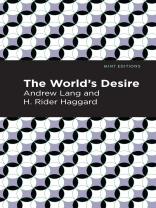Originally published in 1890, The World’s Desire follows a wandering man’s odyssey as he discovers the traumatic fate of his loved ones and native land. He is forced to embark on a new adventure led by the old gods. The story centers the fabled hero of Ithaca, Odysseus, as he returns from his latest trek. Instead of finding his wife and son, he’s blindsided by a natural disaster including a deadly plague. His former home is in shambles and his wife Penelope is a casualty. Odysseus is overcome by grief and inspired to reconnect with his old love, Helen of Troy. Set in Ancient Egypt, Odysseus becomes embroiled in the local politics and personal relationships of its most powerful people. The World’s Desire is a vibrant adventure fantasy inspired by classic Greek mythology. Co-written by H. Rider Haggard and Andrew Lang, it delivers a high-stakes tale of tragedy and triumph. With an eye-catching new cover, and professionally typeset manuscript, this edition of The World’s Desire is both modern and readable.
Since our inception in 2020, Mint Editions has kept sustainability and innovation at the forefront of our mission. Each and every Mint Edition title gets a fresh, professionally typeset manuscript and a dazzling new cover, all while maintaining the integrity of the original book.
With thousands of titles in our collection, we aim to spotlight diverse public domain works to help them find modern audiences. Mint Editions celebrates a breadth of literary works, curated from both canonical and overlooked classics from writers around the globe.
Om författaren
H. Rider Haggard (1856–1925), also known as Sir Henry Rider Haggard, was an English novelist and scholar. He was educated at Ipswich Grammar School and studied with a private tutor in London. Later, Haggard would travel to South Africa where he worked as a governor’s assistant. Upon his return to England, he began writing fiction and nonfiction about his experiences abroad. This led to a successful publishing career which included the novels, King Solomon’s Mines (1885) and Allan Quatermain (1887).












